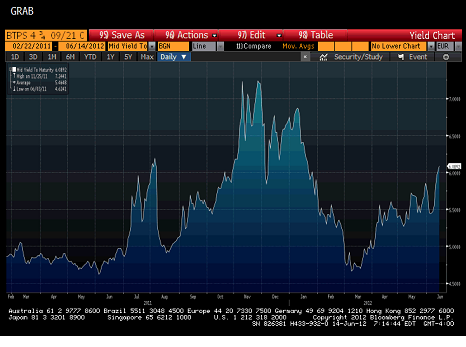by Peter Tchir, TF Market Advisors
Credit Markets Mixed: Spitaly vs Corporates
The first thing most people are noticing today is the weakness in Spanish and Italian bond yields. Spanish and Italian CDS are both wider as well. There is a lot of talk about what it means to hit 7% on 10 year bond yields. For Portugal, Ireland, and Greece that was more or less a trigger of worse to come. Ireland actually crossed 7% again in May having been below that since January. Since it spiked above 7% on the 15th it has been stable. Italy, last year’s poster child, went above 7% are returned below multiple times. Yes, 7% does make a nice headline, and it is the pre-fee return a hedge fund has to make before the investor starts earning more than the fund, but it is far from clear that it is the point of no return for bondholders, especially after the EU and ECB apparently learned their lesson last year.

It is definitely a big concern, and yet MAIN and XOVER are both basically unchanged this morning, and IG18 and HY18 are both tighter. I’m not sure what the explanation is. IG and HY probably got oversold into the close, but it is far from obvious why MAIN and XOVER would be so calm in the face of rising yields in Spain and Italy.
Other “Risk-On” Assets Mixed As Well
European stocks are down on average, but Spanish stocks are up. It is just a strange signal to see weakness in sovereign debt yet for the stocks to do well.
Greek bank stocks have been up solidly, though why anything would be left for existing shareholders no matter who wins the election is beyond me.
JPM was up solidly yesterday, and XLF was almost unchanged, yet the broader market sold off hard into the close, which again seemed to break with the idea of financials being a leader.
Oil is down, but gold is up, though I have been losing track now of whether gold is a risk-on or risk-off asset.
Even the Euro is somehow better today, which is in line with U.S. stock futures but not moving as you would expect given the mess in Spain and Italy.
Weak Data vs Policy Intervention
Nothing has changed in this respect. The global economic data continues to come in weak and is not supportive at these levels. Small policy steps have been taken and the threat of more policy action is supportive of the market here.
Is “whale trade” done trending?
Mr. Dimon’s testimony seemed to go about as well as one could hope. They tone wasn’t as acrimonious as people feared and with only a couple weeks left in the quarter the estimate of a “solidly profitable” quarter is probably pretty accurate. By the end of the testimony, many pundits were asking what the point was? Exactly, there was no real point. This is a private company that had a trade that morphed into something big and wrong, but it still profitable and never put any “taxpayer” money at risk.
If the scapegoating is over, and the trade is under control (and I believe it is), then this should be a chance for JPM to start a recover back to at least the levels of when the made the announcement. In a normal world, I would expect it to drag other risk assets with it.
Bailouts, Subordination, and SMP
There remains a lot of confusion about what is going on in Europe. Asides from the confusion over how “subordinated” Spanish bond investors will or won’t be, there is even greater confusion about how the bailout is funded. Yesterday we explained how Italy isn’t borrowing at 6% to lend at 3%. We also once again look at the errors in how people are looking at subordination.
There are a lot of very influential people out there negative on the bailout. I can understand that, but many are basing it on incorrect information (how EFSF and ESM work) or overly pessimistic views – that Spain is the borrower and gets no value while subordinating everyone else. Just like in the past, people have decided to be optimistic and not dig into details, now people have decided to be pessimistic and not dig into details. That didn’t work out well when people thought the original EFSF deal was good, it may not work out well now thinking that the use of FROB is trivial.
On the other hand, I have heard people asking about SMP today with yield hitting new highs. SMP will not be used by the ECB. If people are worried about subordination, the worst tool is for the ECB to use SMP. The ECB spends money that doesn’t even go to the sovereign, and subordinates all holders. SMP is real subordination as the borrower receives nothing, and the existing holders are in worse shape.
If anything, look for EFSF to assume the role of secondary market purchases. That would have the benefit of taking prices higher without the de facto subordination of remaining bondholders.
It is more likely that they let yields hang out up here for a bit. It really doesn’t cost the countries anything and may be a good strategy to get remaining longs out and create a solid short base ahead of some new EFSF program or new LTRO. If the LTRO was designed to create a “carry” trade, now is much better time than in February.
We may even seen some intervention in the primary markets, but I suspect they would wait until ESM is launched because ESM has a much easier time getting leverage, especially if it is finally given the banking license so many want it to get.
Copyright © TF Market Advisors










